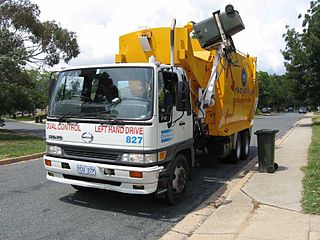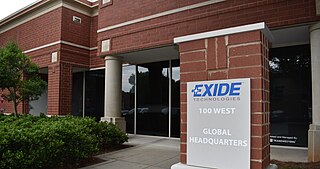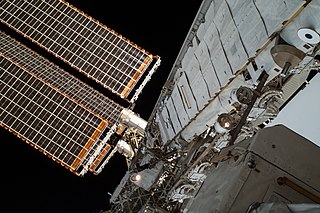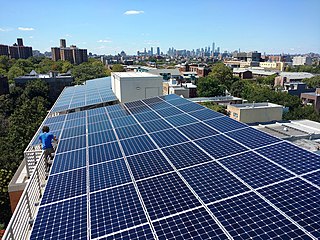
Distributed generation, also distributed energy, on-site generation (OSG), or district/decentralized energy, is electrical generation and storage performed by a variety of small, grid-connected or distribution system-connected devices referred to as distributed energy resources (DER).

A garbage truck is a truck specially designed to collect municipal solid waste and transport it to a solid waste treatment facility, such as a landfill, recycling center or transfer station. In Australia they are commonly called rubbish trucks, or garbage trucks, while in the U.K. dustbin lorry, rubbish lorry or bin lorry is commonly used. Other common names for this type of truck include trash truck in the United States, and refuse truck, dustcart, junk truck, bin wagon or bin van elsewhere. Technical names include waste collection vehicle and refuse collection vehicle (RCV). These trucks are a common sight in most urban areas.

A compactor is a machine or mechanism used to reduce the size of material such as waste material or bio mass through compaction. A trash compactor is often used by business and public places like hospitals to reduce the volume of trash they produce. A baler-wrapper compactor is often used for making compact and wrapped bales in order to improve logistics.

A solar panel is a device that converts sunlight into electricity by using photovoltaic (PV) cells. PV cells are made of materials that produce excited electrons when exposed to light. The electrons flow through a circuit and produce direct current (DC) electricity, which can be used to power various devices or be stored in batteries. Solar panels are also known as solar cell panels, solar electric panels, or PV modules.

A waste container, also known as a dustbin, rubbish bin, trash can, and garbage can, among other names, is a type of container intended to store waste that is usually made out of metal or plastic. The words "rubbish", "basket" and "bin" are more common in British English usage; "trash" and "can" are more common in American English usage. "Garbage" may refer to food waste specifically or to municipal solid waste in general.

Kerbside collection or curbside collection is a service provided to households, typically in urban and suburban areas, of collecting and disposing of household waste and recyclables. It is usually accomplished by personnel using specially built vehicles to pick up household waste in containers that are acceptable to, or prescribed by, the municipality and are placed on the kerb.

Exide was originally a brand name for batteries produced by The Electric Storage Battery Company and later became Exide Holdings, Inc. doing business as Exide Technologies, an American lead-acid batteries manufacturing company. Exide Holdings manufactured automotive batteries and industrial batteries. Exide Holdings is based in Milton, Georgia, United States.

The Integrated Truss Structure (ITS) of the International Space Station (ISS) consists of a linear arranged sequence of connected trusses on which various unpressurized components are mounted such as logistics carriers, radiators, solar arrays, and other equipment. It supplies the ISS with a bus architecture. It is approximately 110 meters long and is made from aluminium and stainless steel.
An automated vacuum waste collection system, also known as pneumatic refuse collection, or automated vacuum collection (AVAC), transports waste at a high speed through underground pneumatic tubes to a collection station where it is compacted and sealed in containers. When the container is full, it is transported away and then emptied. The system helps facilitate the separation and recycling of waste.

BP Solar was a manufacturer and installer of photovoltaic solar cells headquartered in Madrid, Spain, with production facilities in Frederick, MD, India and the People's Republic of China. It was a subsidiary of BP.

India's solar power installed capacity was 84.28 GW AC as of 31 May 2024. India is the third largest producer of solar power globally.

Solar power, also known as solar electricity, is the conversion of energy from sunlight into electricity, either directly using photovoltaics (PV) or indirectly using concentrated solar power. Solar panels use the photovoltaic effect to convert light into an electric current. Concentrated solar power systems use lenses or mirrors and solar tracking systems to focus a large area of sunlight to a hot spot, often to drive a steam turbine.

An electric vehicle battery is a rechargeable battery used to power the electric motors of a battery electric vehicle (BEV) or hybrid electric vehicle (HEV).

Solar power includes solar farms as well as local distributed generation, mostly on rooftops and increasingly from community solar arrays. In 2023, utility-scale solar power generated 164.5 terawatt-hours (TWh), or 3.9% of electricity in the United States. Total solar generation that year, including estimated small-scale photovoltaic generation, was 238 TWh.
The following outline is provided as an overview of and topical guide to solar energy:
Ecube Labs Co., Ltd. is a manufacturer of smart and connected waste bins and solar-powered portable waste compactors, reflecting the broader, global trend of Internet of Things. Ecube Lab's garbage containers are equipped with sensors capable of monitoring their fill-level and bin status. This allows waste collectors to reduce operating costs by up to 80% through lowering collection frequency.
A solar-powered waste compactor is a smart device that reads a waste bin's fill-level in real-time and triggers an automatic compaction of the waste, effectively increasing the bin's capacity by up to 5-8 times. The compaction mechanism runs on a battery, which is charged by the solar panel. Fully charged, the battery reserve lasts for approximately 3–4 weeks, depending on the compaction frequency and usage patterns.

Waste management in Taiwan refers to the management and disposal of waste in Taiwan. It is regulated by the Department of Waste Management of the Ministry of Environment of the Executive Yuan.
A bin tipper, also known as a bin-tipper, bin lifter, cart dumper or Dumpmaster, is a machine which mechanically lifts and inverts bins/carts for the purpose of emptying them. Bin tippers are a type of lifting equipment used in many industries, including waste management, food processing, chemical manufacturing and facility management.
There are many practical applications for solar panels or photovoltaics. From the fields of the agricultural industry as a power source for irrigation to its usage in remote health care facilities to refrigerate medical supplies. Other applications include power generation at various scales and attempts to integrate them into homes and public infrastructure. PV modules are used in photovoltaic systems and include a large variety of electrical devices.













